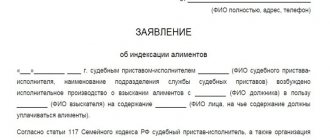(official current edition, full text of Article 274 of the Code of Civil Procedure of the Russian Federation)
| 1. The court, having considered the application for adoption, makes a decision by which it satisfies the request of the adoptive parents (adoptive parent) to adopt the child or refuses to satisfy it. When satisfying a request for adoption, the court recognizes the child as adopted by specific persons (person) and indicates in the court decision all the information about the adopted person and the adoptive parents (adoptive parent) necessary for state registration of adoption in the civil registry office. The court, having granted the application for adoption, may refuse to satisfy the request of the adoptive parents (adoptive parent) to register them as the parents (parent) of the child in the record of the act of his birth, as well as to change the date and place of birth of the child. 2. When an application for adoption is granted, the rights and obligations of the adoptive parents (adoptive parent) and the adopted child are established from the date the court decision on the adoption of the child enters into legal force. 2.1. An appeal or submission against a court decision to approve an application for adoption of a child can be filed within ten days from the date of the court decision in its final form. 3. A copy of the court decision on the adoption of a child is sent by the court within three days from the date the court decision enters into legal force to the civil registry office at the place where the court decision was made for state registration of the adoption of the child. |
Requirements for the reasoning part of the decision in Article 274 of the Code of Civil Procedure of the Russian Federation
When resolving a claim for adoption, according to Article 274 of the Code of Civil Procedure of the Russian Federation, the court must, in the reasoning part of the decision, discuss the question of whether there are grounds that exclude the applicant from being an adoptive parent.
Cannot be adoptive parents:
- minors, even if they acquire full legal capacity;
- unmarried persons if the age difference between them and the adoptees is less than 16 years, with the exception of cases of adoption of a child by a stepfather (stepmother), as well as cases where the court recognizes that there are good reasons for the adoption of a child by an unmarried person there is an age difference between them of less than 16 years (for example, if the child is attached to the person who wants to adopt him, considers him his parent, etc.);
- persons who are not married to each other in relation to the same child.
When deciding whether the health status of an applicant who wishes to adopt a child will prevent him from properly exercising parental rights and responsibilities, it is necessary to take into account that the List of diseases in the presence of which a person cannot adopt a child, take him into custody (trusteeship), take to a foster family, approved by Decree of the Government of the Russian Federation of February 14, 2013 N 117.
If the child has parents, then their consent is a prerequisite for adoption. The parent's consent to adoption is determined by the guardianship and trusteeship authority, or can be expressed directly in court during the adoption process. Consent to adoption given by a parent in court must be recorded in the protocol and signed by him personally, and also reflected in the decision. It is necessary to take into account that, based on the priority of the rights of the parents, any of them can, before making a decision, revoke their previously given consent to adoption, regardless of the motives that prompted him to do this.
If children with parents are under guardianship, in foster families, educational, medical, treatment and preventive institutions, social welfare institutions and other similar institutions, then written consent to their adoption by guardians (trustees), adoptive parents, heads of institutions, in which children are located does not exclude the need to obtain parental consent for the adoption of a child, except in cases provided for in Art. 130 SK.
The refusal of a guardian (trustee), adoptive parents or heads of these institutions to give consent to adoption, in contrast to the refusal of parents, does not prevent the court from positively resolving the issue of adoption if the interests of the child so require.
Adoption is permissible in the absence of the consent of the child’s parents in the cases provided for in Art. 130 SK. The list of such cases is exhaustive.
It is necessary to take into account that:
- recognition of a parent by the court as having limited legal capacity does not provide grounds for adopting a child without the consent of such a parent, since in accordance with Art. 30 of the Civil Code it is limited only in property rights;
- The reasons why a parent does not live with the child for more than 6 months, evades his upbringing and maintenance, are established by the court when considering an application for adoption on the basis of a study and assessment of the totality of all the evidence presented (for example, reports from internal affairs bodies about the location of a parent evading from paying alimony, wanted, witness statements and other admissible evidence);
- adoption can be carried out in the absence of parental consent if the children were abandoned, found during a natural disaster or in areas where hostilities took place, as well as in other emergency circumstances, about which there is a corresponding act issued in the prescribed manner by the internal affairs bodies, and the parents of these children are unknown.
When considering an application for adoption filed by a married person, it must be borne in mind that adoption in accordance is possible only with the consent of the applicant's spouse.
The exception is when the court considering the application for adoption finds that the spouses have terminated their family relationship, have not lived together for more than a year, and the place of residence of the applicant’s spouse is unknown.
These circumstances can be established by means of proof provided for in Art. Civil Procedure Code, as well as a court decision that has entered into legal force recognizing this spouse as missing.
The consent of a child who has reached the age of 10 to be adopted is determined by the guardianship authority and is formalized in writing or reflected in a conclusion on the validity and compliance of the adoption with the interests of the child. The presence or absence of consent can be established by the court itself if a child is involved in the case (see comments to Article 273 of the Code of Civil Procedure).
If the child whom the applicant wishes to adopt has brothers and sisters who were also left without parental care, and in relation to them the applicant does not raise the question of adoption, or other persons want to adopt these children, adoption is permissible only when it is in the interests of the child (for example , children are not aware of their relationship, did not live and were not raised together, cannot live and be raised together for health reasons).
When deciding on the admissibility of adoption in each specific case, one should check and take into account the moral and other personal qualities of the adoptive parent (circumstances characterizing the applicant’s behavior at work, at home, the presence of a criminal record for crimes against the person, for mercenary and other intentional crimes), his state of health , as well as family members living with him, the relationships that have developed in the family, the relationships that have arisen between these persons and the child, as well as the material and living conditions of the future adoptive parents. These circumstances must be equally taken into account when adopting a child by both strangers, stepfather, stepmother, and his relatives.
First stage
According to the norm of Article 125 of the Family Code, adoption cases are conducted in a special manner by federal judges . The following must be involved in the process:
- adoptive parent;
- guardianship representative;
- prosecutor;
- the child himself, if he is over 14 years old.
Before going to court, the candidacy of the adoptive parent is carefully checked , and if one of the conditions that prevents adoption is revealed (actually confirmed), then even the judge will not take responsibility for transferring the child to the applicant. Thus, the court, at the request of the guardianship council, will refuse adoption if it turns out that the applicant has a criminal record, was previously deprived of guardianship, or is seriously ill.
In addition, before the trial, all issues with the guardianship council must be resolved:
- register as a potential adoptive parent;
- undergo special training (if necessary);
- fill out all the necessary papers;
- finally decide on the choice of the baby.
However, consent to adoption must be obtained:
- wife or husband for adoption;
- the baby himself, if he is over 10 years old;
- parents who are not deprived of their rights;
- guardianship authority (in the form of a conclusion).
If there are no complaints from the guardianship, then the court will consider the adoption according to special rules. But first you need to determine which court to go to. In Article 269 of the Code of Civil Procedure there is a rule according to which you need to declare:
Which court should I go to?
- to a city or district court, if the adoptive parent is a citizen of the Russian Federation;
- in the regional, regional or republican, if the adoptive parent is a foreigner or lives abroad.
In this case, the court is geographically located at the child’s place of residence. The special procedure for considering such cases is that the meetings are held closed, without outsiders.
Application to court for adoption of a child
The basis for any judicial action is a statement . Chapter 29
The Code of Civil Procedure is entirely devoted to the adoption procedure. Among other things, there are explanations about what an application to the court for adoption should contain and what documents the judge should see.
So, as required by Article 270 of the Code, the application must indicate:
- Full name of the adoptive parent;
- place of residence and registration;
- Contact phone numbers;
- Full name and birthday of the child;
- address of his place of residence;
- information about whether there are parents, brothers, sisters;
- circumstances under which the child is adopted (documented);
- request to change the baby’s personal data (first name, patronymic, last name, date and place of birth, records of parents).
How does the adoption process work?
The procedure for adoption is indicated in Art. 125 RF IC. The law declares that this form of arrangement is established exclusively in a court hearing. When hearing the case, the following must be present:
- adoptive citizens;
- adoptees, if they have already reached 14 years of age;
- employees of guardianship and trusteeship authorities;
- prosecutor;
- in some situations - biological parents.
Important! The review takes place within the framework of special proceedings. This category of cases does not involve the existence of a dispute. The judge only checks the submitted documents and determines the level of compliance of the applicant’s personality with existing legal requirements.
The interested party does not prepare a claim, but only draws up a special statement. In addition, a separate package of documentation also forms OOP. Officials are required to submit to the judge an opinion on whether the citizen is capable of raising minors.
Application example
To the Kirovsky District Court of Tomsk
APPLICATION FOR ADOPTION
We, citizens of the Russian Federation, Sementsev Ilya Sergeevich, born 04/14/1979, and Sementseva Maria Alexandrovna, born 09/25/1984, ask you to consider the issue of adopting Ivanchenko Sergey Ivanovich, born 06/26/2018, located in Tomsk orphanage "Solnyshko" at the address: Tomsk, st. Severnaya, 432. The mother of the adoptee, Ivanchenko Anna Sergeevna, born 02/20/1980, was deprived of parental rights, the father is unknown, there are no brothers and sisters.
We have been registered in a marriage since 2004. We are able to provide Sergei Ivanovich Ivanchenko with full physical and mental development. Family income level is above average. Ilya Sergeevich Sementsev is an individual entrepreneur, Maria Aleksandrovna Sementseva works at Rearguard Bank OJSC as a bank branch manager in the Kirovsky district of Tomsk. The total joint family income per year is about 1,500,000 rubles, which will provide the child with the necessary living wage.
The family has no housing problems. In common joint ownership there is an apartment with an area of 83 sq.m., located at the address: Tomsk, st. Shevchenko, 170. We have no children together. For medical reasons, the applicant cannot have children.
We visited the Tomsk orphanage “Solnyshko” with the aim of adopting a child for the first time in January 2021, and we established an excellent trusting relationship with Sergey Ivanchenko.
Guided by Art. 124, 125, 127-136 of the Family Code of the Russian Federation, Art. 269-274 Code of Civil Procedure of the Russian Federation,
12/10/2019 Sementsev I.S. Sementseva M.A.
Adoption, judicial practice
The practice of transferring children to adoptive parents is clear: if there is no obvious threat to the health and life of the child, there is confidence that the adopted child will receive everything he needs in the family, judges resolve the case positively.
Adoption is prohibited only in cases of obvious violation of laws, for example, in the following circumstances:
- it is found out that the adoptive parent or spouse is convicted under a serious crime;
- the child's parent is against adoption (provided that he cares about him);
- one of the relatives is adopted (the brother is adopted, but the sister is not);
- housing does not meet standards (dilapidated building, too small area);
- the application was drawn up contrary to the requirements of the Civil Procedure Code.
Has anyone had a trial in the Kirovsky district?
We had a trial in the Kirovsky district in December. Everything was quite formal, but generally friendly. The trial lasted 30-40 minutes. There were us, the guardianship, representatives of the DR, the prosecutor, the judge and the secretary. First we asked to tell us what we were asking, why, about ourselves, etc. (apparently it was necessary to prepare a speech :love:). Then the representative of the DR and the guardianship spoke and various questions were asked. There were a lot of questions, although we had all the documents very well. good ones. They asked what had already been bought for the child, where we would prescribe it, whether they knew at work, according to diagnoses, etc. and so on. There were even some very unexpected ones - why didn’t they do IVF, since the income was high?:010: But I repeat that in general everything was friendly. The request for immediate entry into force was rejected - it was necessary to agree on this in the DR - if they had applied, everything would have been ok. The judge also asked if there were photographs - unfortunately, we didn’t have any. Apparently, it’s better to do :073: There seems to be only one adoption judge there (she had several cases heard in a row).
Adoption through the courts with the help of our family law attorney is your right choice. Recently, an increasing number of people who cannot, or for some reason do not want to give birth to a child, go for adoption. This process in our state, unfortunately, has not yet reached the level where everything happens quickly and without much bureaucratic or paperwork. However, this does not stop many who want to become adoptive parents of a child, even though they will have to go through the adoption trial of the child. Let us note right away that these issues are resolved taking into account the requirements of the law, and they are quite strict and are carefully checked by specialists. The procedure for adopting a child and adopting children is prescribed by law, which must be observed. Our lawyer will help you do everything correctly and in the shortest possible time.








